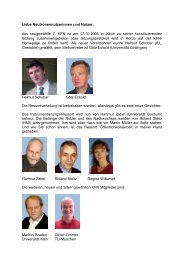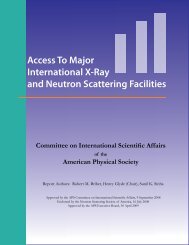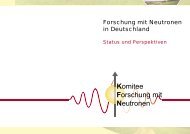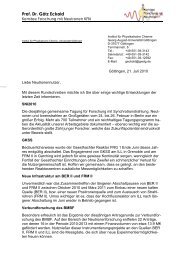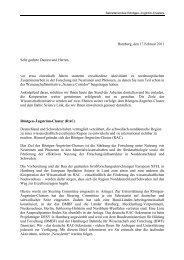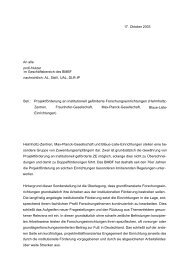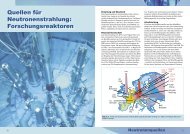- Page 1:
Deutsche Tagung für Forschung mit
- Page 4 and 5:
Impressum: Herausgeber: A. Schreyer
- Page 6 and 7:
8:00 9:30 10:00 10:30 11:00 12:30 1
- Page 8 and 9:
Postersitzung A Mittwoch, 4. Oktobe
- Page 10 and 11:
Postersitzung B Donnerstag, 5. Okto
- Page 12 and 13:
12:30 - 13:35 Mittagspause Plenarsi
- Page 14 and 15:
Allgemeine Hinweise Tagungsort Die
- Page 16 and 17:
Lageplan Mensa Studierendenhaus (Ha
- Page 18 and 19:
Plenarvortrag Mi., 10:00-10:30 M-PV
- Page 20 and 21:
Plenarvortrag Mi., 17:00-17:30 M-PV
- Page 22 and 23:
Plenarvortrag Do., 13:00-15:30 D-PV
- Page 24 and 25:
Plenarvortrag Fr., 09:00-09:30 F-PV
- Page 26 and 27:
Plenarvortrag Fr., 14:00-14:25 F-PV
- Page 28 and 29:
Plenarvortrag Fr., 14:40-14:55 F-PV
- Page 30 and 31:
SNI für Neugierige Do., 15:30-16:0
- Page 32 and 33:
SNI für Neugierige Do., 16:30-17:0
- Page 34 and 35:
Senatsempfang Do., nach 18:00 D-AV1
- Page 36 and 37:
Mikroskopie und Tomographie Vortrag
- Page 38 and 39:
Mikroskopie und Tomographie Vortrag
- Page 40 and 41:
Dynamik Vortrag: Mi., 11:00-11:30 M
- Page 42 and 43:
Dynamik Vortrag: Mi., 11:50-12:10 M
- Page 44 and 45:
Nanostrukturen und Grenzflächen Vo
- Page 46 and 47:
Nanostrukturen und Grenzflächen Vo
- Page 48 and 49:
Magnetismus Vortrag: Mi., 17:40-18:
- Page 50 and 51:
Magnetismus Vortrag: Mi., 18:20-18:
- Page 52 and 53:
Struktur Vortrag: Mi., 17:40-18:00
- Page 54 and 55:
Struktur Vortrag: Mi., 18:20-18:40
- Page 56 and 57:
Nanostrukturen und Grenzflächen Vo
- Page 58 and 59:
Nanostrukturen und Grenzflächen Vo
- Page 60 and 61:
Methoden und Instrumentierung Vortr
- Page 62 and 63:
Methoden und Instrumentierung Vortr
- Page 64 and 65:
Weiche Materie Vortrag: Do., 10:00-
- Page 66 and 67:
Materialien/Werkstoffe Vortrag: Do.
- Page 68 and 69:
Materialien/Werkstoffe Vortrag: Do.
- Page 70 and 71:
Methoden und Instrumentierung Vortr
- Page 72 and 73:
Methoden und Instrumentierung Vortr
- Page 74 and 75:
Methoden und Instrumentierung Vortr
- Page 76 and 77:
Methoden und Instrumentierung Vortr
- Page 78 and 79:
Methoden und Instrumentierung Vortr
- Page 80 and 81:
Methoden und Instrumentierung Vortr
- Page 82 and 83:
Weiche Materie Vortrag: Fr., 10:00-
- Page 84 and 85:
Materialien/Werkstoffe Vortrag: Fr.
- Page 86 and 87:
Materialien/Werkstoffe Vortrag: Fr.
- Page 88 and 89:
Magnetismus Vortrag: Fr., 10:00-10:
- Page 90 and 91:
Biologische Systeme und Medizin Vor
- Page 92 and 93:
Biologische Systeme und Medizin Vor
- Page 94 and 95:
Biologische Systeme und Medizin Vor
- Page 96 and 97:
Biologische Systeme und Medizin Vor
- Page 98 and 99:
Chemische Prozesse und Phasenüberg
- Page 100 and 101:
Chemische Prozesse und Phasenüberg
- Page 102 and 103:
Magnetismus Vortrag: Fr., 11:30-11:
- Page 104 and 105:
Magnetismus Vortrag: Fr., 12:10-12:
- Page 106 and 107:
Methoden und Instrumentierung Poste
- Page 108 and 109:
Methoden und Instrumentierung Poste
- Page 110 and 111:
Methoden und Instrumentierung Poste
- Page 112 and 113:
Methoden und Instrumentierung Poste
- Page 114 and 115:
Methoden und Instrumentierung Poste
- Page 116 and 117:
Methoden und Instrumentierung Poste
- Page 118 and 119:
Methoden und Instrumentierung Poste
- Page 120 and 121:
Methoden und Instrumentierung Poste
- Page 122 and 123:
Methoden und Instrumentierung Poste
- Page 124 and 125:
Methoden und Instrumentierung Poste
- Page 126 and 127:
Methoden und Instrumentierung Poste
- Page 128 and 129:
Methoden und Instrumentierung Poste
- Page 130 and 131:
Methoden und Instrumentierung Poste
- Page 132 and 133:
Methoden und Instrumentierung Poste
- Page 134 and 135:
Methoden und Instrumentierung Poste
- Page 136 and 137:
Methoden und Instrumentierung Poste
- Page 138 and 139:
Methoden und Instrumentierung Poste
- Page 140 and 141:
Methoden und Instrumentierung Poste
- Page 142 and 143:
Methoden und Instrumentierung Poste
- Page 144 and 145:
Methoden und Instrumentierung Poste
- Page 146 and 147:
Methoden und Instrumentierung Poste
- Page 148 and 149:
Methoden und Instrumentierung Poste
- Page 150 and 151:
Methoden und Instrumentierung Poste
- Page 152 and 153:
Methoden und Instrumentierung Poste
- Page 154 and 155:
Methoden und Instrumentierung Poste
- Page 156 and 157:
Methoden und Instrumentierung Poste
- Page 158 and 159:
Methoden und Instrumentierung Poste
- Page 160 and 161:
Methoden und Instrumentierung Poste
- Page 162 and 163:
Methoden und Instrumentierung Poste
- Page 164 and 165:
Methoden und Instrumentierung Poste
- Page 166 and 167:
Methoden und Instrumentierung Poste
- Page 168 and 169:
Methoden und Instrumentierung Poste
- Page 170 and 171:
Methoden und Instrumentierung Poste
- Page 172 and 173:
Methoden und Instrumentierung Poste
- Page 174 and 175:
Methoden und Instrumentierung Poste
- Page 176 and 177:
Methoden und Instrumentierung Poste
- Page 178 and 179:
Methoden und Instrumentierung Poste
- Page 180 and 181:
Methoden und Instrumentierung Poste
- Page 182 and 183:
Methoden und Instrumentierung Poste
- Page 184 and 185:
Methoden und Instrumentierung Poste
- Page 186 and 187:
Methoden und Instrumentierung Poste
- Page 188 and 189:
Methoden und Instrumentierung Poste
- Page 190 and 191:
Methoden und Instrumentierung Poste
- Page 192 and 193:
Methoden und Instrumentierung Poste
- Page 194 and 195:
Methoden und Instrumentierung Poste
- Page 196 and 197:
Methoden und Instrumentierung Poste
- Page 198 and 199:
Methoden und Instrumentierung Poste
- Page 200 and 201:
Methoden und Instrumentierung Poste
- Page 202 and 203:
Mikroskopie und Tomographie Poster:
- Page 204 and 205:
Mikroskopie und Tomographie Poster:
- Page 206 and 207:
Mikroskopie und Tomographie Poster:
- Page 208 and 209:
Mikroskopie und Tomographie Poster:
- Page 210 and 211:
Mikroskopie und Tomographie Poster:
- Page 212 and 213:
Mikroskopie und Tomographie Poster:
- Page 214 and 215:
Mikroskopie und Tomographie Poster:
- Page 216 and 217:
Mikroskopie und Tomographie Poster:
- Page 218 and 219:
Mikroskopie und Tomographie Poster:
- Page 220 and 221:
Struktur und Dynamik Poster: Mi., 1
- Page 222 and 223:
Struktur und Dynamik Poster: Mi., 1
- Page 224 and 225:
Struktur und Dynamik Poster: Mi., 1
- Page 226 and 227:
Struktur und Dynamik Poster: Mi., 1
- Page 228 and 229:
Struktur und Dynamik Poster: Mi., 1
- Page 230 and 231:
Struktur und Dynamik Poster: Mi., 1
- Page 232 and 233:
Struktur und Dynamik Poster: Mi., 1
- Page 234 and 235:
Struktur und Dynamik Poster: Mi., 1
- Page 236 and 237:
Struktur und Dynamik Poster: Mi., 1
- Page 238 and 239:
Struktur und Dynamik Poster: Mi., 1
- Page 240 and 241:
Struktur und Dynamik Poster: Mi., 1
- Page 242 and 243:
Struktur und Dynamik Poster: Mi., 1
- Page 244 and 245:
Struktur und Dynamik Poster: Mi., 1
- Page 246 and 247:
Struktur und Dynamik Poster: Mi., 1
- Page 248 and 249:
Struktur und Dynamik Poster: Mi., 1
- Page 250 and 251:
Struktur und Dynamik Poster: Mi., 1
- Page 252 and 253:
Struktur und Dynamik Poster: Mi., 1
- Page 254 and 255:
Struktur und Dynamik Poster: Mi., 1
- Page 256 and 257:
Struktur und Dynamik Poster: Mi., 1
- Page 258 and 259:
Struktur und Dynamik Poster: Mi., 1
- Page 260 and 261:
Struktur und Dynamik Poster: Mi., 1
- Page 262 and 263:
Struktur und Dynamik Poster: Mi., 1
- Page 264 and 265:
Struktur und Dynamik Poster: Mi., 1
- Page 266 and 267:
Struktur und Dynamik Poster: Mi., 1
- Page 268 and 269:
Struktur und Dynamik Poster: Mi., 1
- Page 270 and 271:
Struktur und Dynamik Poster: Mi., 1
- Page 272 and 273:
Struktur und Dynamik Poster: Mi., 1
- Page 274 and 275:
Chemische Prozesse und Phasenüberg
- Page 276 and 277:
Chemische Prozesse und Phasenüberg
- Page 278 and 279:
Chemische Prozesse und Phasenüberg
- Page 280 and 281:
Chemische Prozesse und Phasenüberg
- Page 282 and 283:
Chemische Prozesse und Phasenüberg
- Page 284 and 285:
Chemische Prozesse und Phasenüberg
- Page 286 and 287:
Biologische Systeme und Medizin Pos
- Page 288 and 289:
Biologische Systeme und Medizin Pos
- Page 290 and 291:
Biologische Systeme und Medizin Pos
- Page 292 and 293:
Biologische Systeme und Medizin Pos
- Page 294 and 295:
Biologische Systeme und Medizin Pos
- Page 296 and 297:
Biologische Systeme und Medizin Pos
- Page 298 and 299:
Biologische Systeme und Medizin Pos
- Page 300 and 301:
Biologische Systeme und Medizin Pos
- Page 302 and 303:
Biologische Systeme und Medizin Pos
- Page 304 and 305:
Biologische Systeme und Medizin Pos
- Page 306 and 307:
Biologische Systeme und Medizin Pos
- Page 308 and 309:
Biologische Systeme und Medizin Pos
- Page 310 and 311:
Biologische Systeme und Medizin Pos
- Page 312 and 313:
Biologische Systeme und Medizin Pos
- Page 314 and 315:
Biologische Systeme und Medizin Pos
- Page 316 and 317:
Biologische Systeme und Medizin Pos
- Page 318 and 319:
Biologische Systeme und Medizin Pos
- Page 320 and 321:
Magnetismus Poster: Do., 13:00-15:3
- Page 322 and 323:
Magnetismus Poster: Do., 13:00-15:3
- Page 324 and 325:
Magnetismus Poster: Do., 13:00-15:3
- Page 326 and 327:
Magnetismus Poster: Do., 13:00-15:3
- Page 328 and 329:
Magnetismus Poster: Do., 13:00-15:3
- Page 330 and 331:
Magnetismus Poster: Do., 13:00-15:3
- Page 332 and 333:
Magnetismus Poster: Do., 13:00-15:3
- Page 334 and 335:
Magnetismus Poster: Do., 13:00-15:3
- Page 336 and 337:
Magnetismus Poster: Do., 13:00-15:3
- Page 338 and 339:
Magnetismus Poster: Do., 13:00-15:3
- Page 340 and 341:
Magnetismus Poster: Do., 13:00-15:3
- Page 342 and 343:
Magnetismus Poster: Do., 13:00-15:3
- Page 344 and 345:
Magnetismus Poster: Do., 13:00-15:3
- Page 346 and 347:
Magnetismus Poster: Do., 13:00-15:3
- Page 348 and 349:
Magnetismus Poster: Do., 13:00-15:3
- Page 350 and 351:
Magnetismus Poster: Do., 13:00-15:3
- Page 352 and 353:
Magnetismus Poster: Do., 13:00-15:3
- Page 354 and 355:
Magnetismus Poster: Do., 13:00-15:3
- Page 356 and 357:
Magnetismus Poster: Do., 13:00-15:3
- Page 358 and 359:
Magnetismus Poster: Do., 13:00-15:3
- Page 360 and 361:
Magnetismus Poster: Do., 13:00-15:3
- Page 362 and 363:
Magnetismus Poster: Do., 13:00-15:3
- Page 364 and 365:
Magnetismus Poster: Do., 13:00-15:3
- Page 366 and 367:
Magnetismus Poster: Do., 13:00-15:3
- Page 368 and 369:
Magnetismus Poster: Do., 13:00-15:3
- Page 370 and 371:
Magnetismus Poster: Do., 13:00-15:3
- Page 372 and 373:
Magnetismus Poster: Do., 13:00-15:3
- Page 374 and 375:
Nanostrukturen und Grenzflächen Po
- Page 376 and 377:
Nanostrukturen und Grenzflächen Po
- Page 378 and 379:
Nanostrukturen und Grenzflächen Po
- Page 380 and 381:
Nanostrukturen und Grenzflächen Po
- Page 382 and 383:
Nanostrukturen und Grenzflächen Po
- Page 384 and 385:
Nanostrukturen und Grenzflächen Po
- Page 386 and 387:
Nanostrukturen und Grenzflächen Po
- Page 388 and 389:
Nanostrukturen und Grenzflächen Po
- Page 390 and 391:
Nanostrukturen und Grenzflächen Po
- Page 392 and 393:
Nanostrukturen und Grenzflächen Po
- Page 394 and 395:
Nanostrukturen und Grenzflächen Po
- Page 396 and 397:
Nanostrukturen und Grenzflächen Po
- Page 398 and 399: Nanostrukturen und Grenzflächen Po
- Page 400 and 401: Nanostrukturen und Grenzflächen Po
- Page 402 and 403: Nanostrukturen und Grenzflächen Po
- Page 404 and 405: Nanostrukturen und Grenzflächen Po
- Page 406 and 407: Nanostrukturen und Grenzflächen Po
- Page 408 and 409: Nanostrukturen und Grenzflächen Po
- Page 410 and 411: Nanostrukturen und Grenzflächen Po
- Page 412 and 413: Nanostrukturen und Grenzflächen Po
- Page 414 and 415: Nanostrukturen und Grenzflächen Po
- Page 416 and 417: Nanostrukturen und Grenzflächen Po
- Page 418 and 419: Nanostrukturen und Grenzflächen Po
- Page 420 and 421: Nanostrukturen und Grenzflächen Po
- Page 422 and 423: Nanostrukturen und Grenzflächen Po
- Page 424 and 425: Nanostrukturen und Grenzflächen Po
- Page 426 and 427: Nanostrukturen und Grenzflächen Po
- Page 428 and 429: Weiche Materie Poster: Do., 13:00-1
- Page 430 and 431: Weiche Materie Poster: Do., 13:00-1
- Page 432 and 433: Weiche Materie Poster: Do., 13:00-1
- Page 434 and 435: Weiche Materie Poster: Do., 13:00-1
- Page 436 and 437: Weiche Materie Poster: Do., 13:00-1
- Page 438 and 439: Weiche Materie Poster: Do., 13:00-1
- Page 440 and 441: Weiche Materie Poster: Do., 13:00-1
- Page 442 and 443: Weiche Materie Poster: Do., 13:00-1
- Page 444 and 445: Weiche Materie Poster: Do., 13:00-1
- Page 446 and 447: Weiche Materie Poster: Do., 13:00-1
- Page 450 and 451: Weiche Materie Poster: Do., 13:00-1
- Page 452 and 453: Weiche Materie Poster: Do., 13:00-1
- Page 454 and 455: Weiche Materie Poster: Do., 13:00-1
- Page 456 and 457: Weiche Materie Poster: Do., 13:00-1
- Page 458 and 459: Weiche Materie Poster: Do., 13:00-1
- Page 460 and 461: Weiche Materie Poster: Do., 13:00-1
- Page 462 and 463: Weiche Materie Poster: Do., 13:00-1
- Page 464 and 465: Weiche Materie Poster: Do., 13:00-1
- Page 466 and 467: Weiche Materie Poster: Do., 13:00-1
- Page 468 and 469: Materie unter extremen Bedingungen
- Page 470 and 471: Materie unter extremen Bedingungen
- Page 472 and 473: Materie unter extremen Bedingungen
- Page 474 and 475: Materie unter extremen Bedingungen
- Page 476 and 477: Materialien/Werkstoffe Poster: Do.,
- Page 478 and 479: Materialien/Werkstoffe Poster: Do.,
- Page 480 and 481: Materialien/Werkstoffe Poster: Do.,
- Page 482 and 483: Materialien/Werkstoffe Poster: Do.,
- Page 484 and 485: Materialien/Werkstoffe Poster: Do.,
- Page 486 and 487: Materialien/Werkstoffe Poster: Do.,
- Page 488 and 489: Materialien/Werkstoffe Poster: Do.,
- Page 490 and 491: Materialien/Werkstoffe Poster: Do.,
- Page 492 and 493: Materialien/Werkstoffe Poster: Do.,
- Page 494 and 495: Materialien/Werkstoffe Poster: Do.,
- Page 496 and 497: Materialien/Werkstoffe Poster: Do.,
- Page 498 and 499:
Materialien/Werkstoffe Poster: Do.,
- Page 500 and 501:
Materialien/Werkstoffe Poster: Do.,
- Page 502 and 503:
Materialien/Werkstoffe Poster: Do.,
- Page 504 and 505:
Materialien/Werkstoffe Poster: Do.,
- Page 506 and 507:
Materialien/Werkstoffe Poster: Do.,
- Page 508 and 509:
Materialien/Werkstoffe Poster: Do.,
- Page 510 and 511:
Materialien/Werkstoffe Poster: Do.,
- Page 512 and 513:
Materialien/Werkstoffe Poster: Do.,
- Page 514 and 515:
Materialien/Werkstoffe Poster: Do.,
- Page 516 and 517:
Materialien/Werkstoffe Poster: Do.,
- Page 518 and 519:
Teilchen und Kerne Poster: Do., 13:
- Page 520 and 521:
Teilchen und Kerne Poster: Do., 13:
- Page 522 and 523:
Index Autoren und ihre Beiträge: u
- Page 524 and 525:
Index M-P98, M-P100, M-P101, M-P195
- Page 526 and 527:
Index Deák, L. D-P300 Decker, H. M
- Page 528 and 529:
Index Gavrila, G. D-P276 Gebhardt,
- Page 530 and 531:
Index Homeyer, J. D-P377, D-P389 Ho
- Page 532 and 533:
Index Kravtsov, E. D-P231, D-P252 K
- Page 534 and 535:
Index Mezei, F. M-P13, M-P22, D-V27
- Page 536 and 537:
Index Ponce, M.L. D-P214 Ponkratz,
- Page 538 and 539:
Index Schmidt, O. M-P132, M-P153 Sc
- Page 540 and 541:
Index Stürmer, D. D-P405 Stuermer,
- Page 542:
Index Wochner, P. F-V68 Woiterski,





